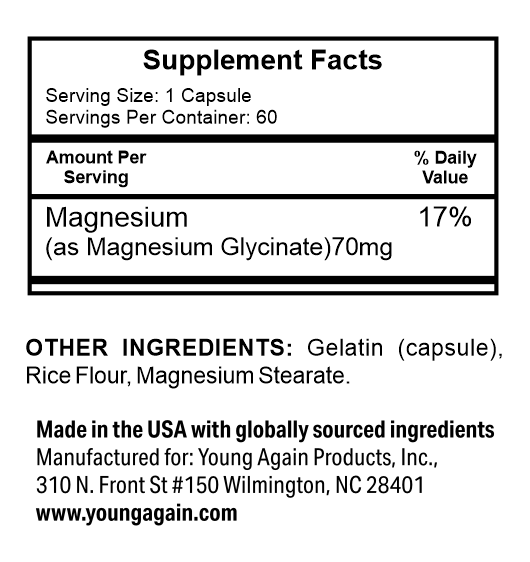Magnesium Glycinate
Magnesium Glycinate
Couldn't load pickup availability
Magnesium Glycinate
Relaxation and Nervous System Support
What This Supports
- Relaxation and restful sleep
- Balanced mood and emotional well-being
- Healthy muscle function and comfort
- Heart and cardiovascular support
- Digestive and nervous system function
- Bone strength and mineral balance
- Energy production and vitality
What Is Magnesium Glycinate?
Magnesium Glycinate is a form of magnesium in which the mineral is bound to glycine, the smallest amino acid. This structure allows for excellent absorption and makes it one of the most gentle, effective forms of magnesium.
Known for its high bioavailability, magnesium glycinate is efficiently absorbed and utilized by the body. It is especially valued for its calming properties, supporting relaxation, sleep, mood balance, and muscle comfort.
Why It Works
Magnesium plays a role in over 300 enzymatic reactions in the body, including muscle function, neurotransmitter regulation, and energy production. When paired with glycine, which itself promotes calmness, the result is a deeply soothing and highly absorbable form of magnesium.
Unlike harsher forms of magnesium, glycinate is gentle on the stomach and does not produce a laxative effect. This makes it an excellent choice for those seeking daily support for stress, sleep, muscle tension, and overall wellness.
Key Benefits of Magnesium Glycinate
Improved Sleep
Magnesium and glycine work together to calm the nervous system, support neurotransmitter balance, and improve sleep quality, helping you fall asleep more easily and stay asleep through the night.
Reduced Anxiety and Stress
Magnesium helps prevent overstimulation of nerve cells, while glycine acts as an inhibitory neurotransmitter. Together, they support a calmer, more stable emotional state.
Muscle Relaxation
Supports normal muscle contractility and helps alleviate cramps, spasms, and tension by balancing calcium uptake in the muscles.
Heart Health
Helps maintain a steady heart rhythm and supports healthy blood pressure already within the normal range.
Digestive Health
Glycinate is gentle and non-laxative, making it suitable for individuals with sensitive stomachs or digestive concerns.
Mood Regulation
Supports serotonin synthesis and healthy neurotransmitter production to promote emotional balance and reduce irritability.
Bone Health
Involved in activating vitamin D so the body can effectively absorb calcium, supporting strong, healthy bones.
Energy Production
Magnesium plays a key role in ATP production, helping your body maintain steady energy and vitality.
Neuroprotection
Research suggests magnesium may support long-term brain health due to its anti-inflammatory and antioxidant properties.
Supplement Facts
Serving Size: 1 Capsule
Servings Per Container: 60
| Amount Per Serving | % Daily Value |
|---|---|
| Magnesium (as Magnesium Glycinate) 70 mg | 17% |
Other Ingredients:
Gelatin (capsule), Rice Flour, Magnesium Stearate.
Additional Benefits
High Absorption: Magnesium glycinate is one of the most bioavailable forms of magnesium.
Gentle Formula: No laxative effect, ideal for daily use.
Calming Support: Helps your mind and body unwind naturally.
How to Use
Take 1 capsule daily, preferably with food, or as directed by your healthcare practitioner. For sleep support, take in the evening.
*This statement has not been evaluated by the Food and Drug Administration. This product is not intended to diagnose, treat, cure, or prevent any disease.
Why People Trust Young Again
- Honest pricing
- Straightforward formulas
- Backed by 30 plus years of results
- Created for aging without fear
Share





